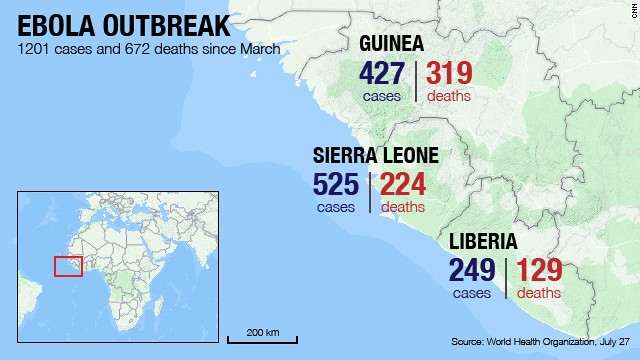Another African Crisis
"It could be helpful for the government to have powers to isolate and quarantine people and it's certainly better than what's been done so far."
"Whether it works, we will have to wait and see."
Dr. Heinz Feldmann, chief of virology, U.S. National Institute of Allergy and Infectious Diseases
"Door-to-door searches are not going to be easy. "What will help is encouraging people to come forward when they see symptoms and seek medical help."
Dr. Unni Krishnan, head, disaster preparedness and response, aid group Plan International
Ebola cases emerged back in March, first in the nation of Guinea, and then it spread across the borders into Liberia and Sierra Leone. The Ebola outbreak now represents the largest recorded in world history, infecting three African capitals, with -- hugely adding to the potential for spreading Ebola around the world -- international airports.
Although local officials are doing their best to screen passengers, an American man was still able to board a flight from Liberia to Nigeria where he became symptomatic of Ebola, and died soon afterward. His death represents the first and only one in Nigeria. Ebola is not readily communicable, but it can be transferred through body fluids; viral agents remain alive for awhile even on a corpse. At funerals it is customary to touch the departed.
Ebola has been blamed for 729 deaths in four West African countries this year, with no signs of it diminishing. In Liberia and Sierra Leone the worst of the outbreaks are raging. People living in remote areas are difficult to reach and even more difficult to convince that they must present to a hospital or clinic and agree to being isolated rather than remain where they are and spread the disease.
Because people living in remote areas are suspicious of strangers, they feel that the Westerners who come to aid them are really infecting them with the disease, resulting in attacks on aid workers. Those who are amenable to reason still have no wish to be taken to a hospital, since there is where people die, and they prefer to be nursed by their relatives, by villagers, rather than consign themselves to death.
But untreated by those who understand the progression of the disease they will die, and their deaths will invariably help to spread the disease. In Freetown, Sierra Leone, security forces were dispatched for house-to-house searches on the lookout for people who are symptomatic of Ebola onset. Across the Globe many governments are advising their populations to avoid travel to Sierra Leone, Liberia and Guinea unless absolutely necessary.
In Liberia, two American aid workers have been struck with Ebola and are in 'grave' but stable condition. One was slated to receive an experimental serum. "There was only enough for one person. Dr. [Kent] Brantley asked that it be given to Nancy Writebo", the president of Samaritan's Purse, an aid organization working in Liberia during the crisis stated.
On the other hand, Dr. Brantley did receive another kind of treatment, one that has been attempted before, but hasn't been necessarily successful. On the theory that someone surviving Ebola might have antibodies to the virus in their blood, giving a sufferer a blood transfusion from that person is hoped to result in a greater chance of survival.
A 14-year-old boy whom Dr. Brantley's medical skills had succeeded in saving from death, on hearing of his doctor's plight, offered his blood for a transfusion to save the doctor's life. "The young boy and his family wanted to be able to help the doctor who saved his life", explained Franklin Graham, president of Samaritan's Purse.
Otherwise, there is at the present time, no drug or vaccine for Ebola. Supportive care consists of constant hydration. There are some experimental drug and vaccines as hoped-for candidates for a protocol to defend against Ebola, but none has been tested in humans, though promising results have resulted in animal models studied.
Many people keep their relatives at home and pray for their survival rather than take them to clinics where, it is well known, there is at least a 60% fatality. Gruesome images of some people who, in their death throes bleed from their eyes mouth, ears and rectum, horrify people. But as long as those infected remain in the community, cared for by relatives, the incidence grows. Soiled linens, touching the ill, spreads the virus.
And even though aid workers are extremely careful to wear protective clothing this alone does not guarantee that they too will become infected. Among deaths that occurred this week one was that of the chief doctor treating Ebola in Sierra Leone. Dr. Sheik Humarr Khan's death was described by authorities as "an irreparable loss of this son of the soil", leaving the country one expert short.
He was 39 years of age, a leading authority on hemorrhagic fevers in a nation with few medical resources.

Labels: Africa, Disease, Health, Humanitarian Crisis, Medicine


<< Home